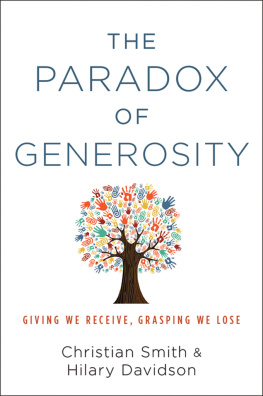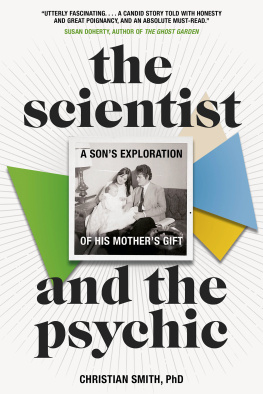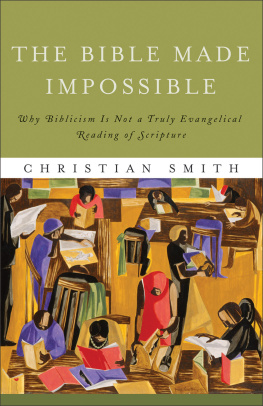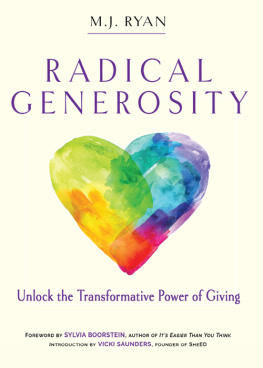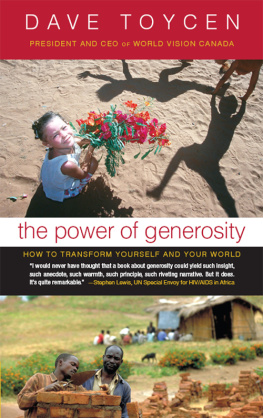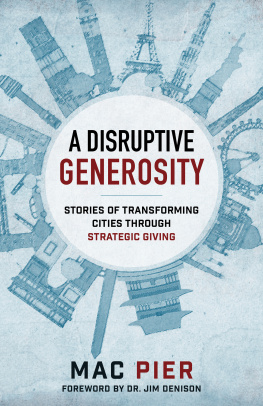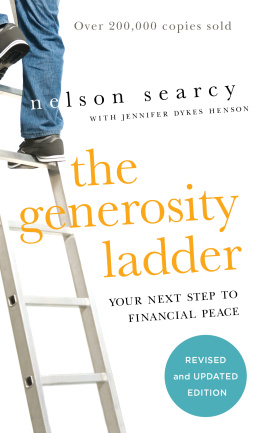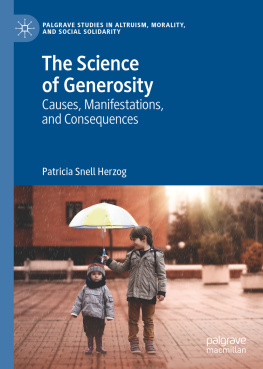The Paradox of Generosity

Oxford University Press is a department of the University of Oxford.
It furthers the Universitys objective of excellence in research, scholarship, and education by publishing worldwide.
Oxford New York
Auckland Cape Town Dar es Salaam Hong Kong Karachi
Kuala Lumpur Madrid Melbourne Mexico City Nairobi
New Delhi Shanghai Taipei Toronto
With offices in
Argentina Austria Brazil Chile Czech Republic France Greece
Guatemala Hungary Italy Japan Poland Portugal Singapore
South Korea Switzerland Thailand Turkey Ukraine Vietnam
Oxford is a registered trademark of Oxford University Press in the UK and certain other countries.
Published in the United States of America by
Oxford University Press
198 Madison Avenue, New York, NY 10016
Oxford University Press 2014
All rights reserved. No part of this publication may be reproduced, stored in a retrieval system, or transmitted, in any form or by any means, without the prior permission in writing of Oxford University Press, or as expressly permitted by law, by license, or under terms agreed with the appropriate reproduction rights organization. Inquiries concerning reproduction outside the scope of the above should be sent to the Rights Department, Oxford University Press, at the address above.
You must not circulate this work in any other form and you must impose this same condition on any acquirer.
Library of Congress Cataloging-in-Publication Data
Smith, Christian, 1960
The paradox of generosity : giving we receive, grasping we lose / by Christian Smith and Hilary Davidson.
pages cm
Includes index.
ISBN 9780199394906 (hardcover : alk. paper)ISBN 9780199394913 (ebook)ISBN 9780199394920 (ebook)ISBN 9780199394937 (online content) 1.Generosity. I.Title.
BJ1533.G4S53 2014
179.9dc23
2014007240
For Helen Q. Smith, R.I.P., generous to the endC.S.S.
For my grandparents, Carl and Anise Swartz,
whose lifelong practices of generosity are an inspirationH.D.
CONTENTS
Thanks to Trish Snell Herzog for her fantastic administrative work on the first half of the Science of Generosity Initiative; without her contribution this book would not exist. Thanks also to Emmie Mediate and Catherine Braunlich for data coding. Matt, Tammy, Mallory, and Natalie Davidson, Alison Miller, Katherine Sorrell, and Paul Ullrich helped to sharpen some of our ideas. Thanks finally to the John Templeton Foundation, particularly to Kimon Sargeant, our program officer, for generously funding the research and collection of data on which this book is based.
The Paradox of Generosity
GENEROSITY IS PARADOXICAL. Those who give, receive back in turn. By spending ourselves for others well-being, we enhance our own standing. In letting go of some of what we own, we better secure our own lives. By giving ourselves away, we ourselves move toward flourishing. This is not only a philosophical or religious teaching; it is a sociological fact.
The generosity paradox can also be stated in the negative. By grasping onto what we currently have, we lose out on better goods that we might have gained. In holding onto what we possess, we diminish its long-term value to us. By always protecting ourselves against future uncertainties and misfortunes, we are affected in ways that make us more anxious about uncertainties and vulnerable to future misfortunes. In short, by failing to care for others, we do not properly take care of ourselves. It is no coincidence that the word miser is etymologically related to the word miserable.
This paradox of generosity should not be surprising. Very many wise observers of human life across all of recorded history have taught different versions of the generosity paradox. An ancient Hebrew proverb, for example, teaches that, One man gives freely, yet gains even more; another withholds unduly, but ends up impoverished. The Buddha teaches, Giving brings happiness at every stage of its expression. A Hindu proverb holds that, They who give have all things, they who withhold have nothing. And Jesus of Nazareth teaches, Whoever tries to keep his life will lose it, and whoever loses his life will preserve it.
But many people today seem not much shaped by the sayings of wise teachers from thousands of years ago. So, if we want to understand the power of generosity in a way that might influence our lives today, it may help to add to this traditional wisdom some empirical findings from social-scientific research. The addition of that knowledge is what this book is about. In recent years, I (Smith) have been leading a study called the Science of Generosity Initiative at the University of Notre Dame, in which I (Davidson) have been deeply involved. In that study, we have been conducting a nationally representative survey of Americans practices and beliefs about generosity, hundreds of interviews with Americans around the country on generosity, and participant-observation studies of local religious congregations. This book presents some key findings of that Science of Generosity Initiative which illuminate the paradox of generosity.
What we have learned is the following. First, the more generous Americans are, the more happiness, health, and purpose in life they enjoy. This association between generous practices and personal well-being is strong and highly consistent across a variety of types of generous practices and measures of well-being. Second, we have excellent reason to believe that generous practices actually create enhanced personal well-being. The association between generosity and well-being is not accidental, spurious, or simply an artifact of reverse causal influence. Certain well-known, explicable causal mechanisms explain to us the specific ways that generous practices shape positive well-being outcomes. Third, the way Americans talk about generosity confirms and illustrates the first two points. The paradox of generosity is evident in the lives of Americans. Fourth, despite all of this, it turns out that many Americans fail to live generous lives. A lot of Americans are indeed very generousbut even more are not. And so the latter are deprived, by their lack of generosity, of the greater well-being that generous practices would likely afford them. This is the second paradox of generosity. Finally, as we mentioned above, many wise writers, philosophers, religious teachers, sages, and mystics have been teaching us about the paradox of generosity for thousands of years. What todays empirical social-science research tells us only confirms what we might have known all along, had we trusted traditional teachers.
That, in brief, is the story of this book. By the time we are done with that story, the inescapable existential questions will have also grown clearer and sharper: Will we live generous lives or wont weboth as persons and as a society? Why or why not? And what will that mean for the quality of our own lives, for the lives of those around us, and for our entire society? In the end, all responsible science comes back to basic human questions about what is finally good and valuable in life. That is certainly true about the science of generosity, and will remain one reference point of this book.
What Is Generosity?
The modern English word generosity derives from the Latin word genersus, which means of noble birth. That Latin word was passed down to English through the Old French word

